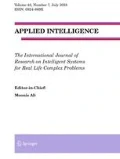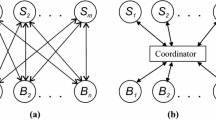Abstract
When selfish industries are competing for limited shared resources, they need to coordinate their activities to handle possible conflicting situations. Moreover, this coordination should not affect the activities already planned by the industries, since this could have negative effects on their performance. Although agents may have buffers that allow them to delay the use of resources, these are of a finite capacity, and therefore cannot be used indiscriminately. Thus, we are faced with the problem of coordinating schedules that have already been generated by the agents. To address this task, we propose to use a recurrent auction mechanism to mediate between the agents. Through this auction mechanism, the agents can express their interest in using the resources, thus helping the scheduler to find the best distribution. We also introduce a priority mechanism to add fairness to the coordination process. The proposed coordination mechanism has been applied to a waste water treatment system scenario, where different industries need to discharge their waste. We have simulated the behavior of the system, and the results show that using our coordination mechanism the waste water treatment plant can successfully treat most of the discharges, while the production activity of the industries is almost not affected by it.
Similar content being viewed by others
References
Arrow KJ, Sen AK, Suzumura K (eds) (2002) Handbook of social choice and welfare. North-Holland, Amsterdam
Brucker P, Heitmann S, Hurink J (2003) Flow-shop problems with intermediate buffers. OR Spectr 25:549–574
Chevaleyre Y, Dunne P, Endriss U, Lang J, Lemaître M, Maudet N, Padget J, Phelps S, Rodríguez-Aguilar J, Sousa P (2006) Issues in multiagent resource allocation. Informatica 30:3–31
Chevaleyre Y, Endriss U, Estivie S, Maudet N (2007) Reaching envy-free states in distributed negotiation settings. In: Veloso M (ed) Proceedings of the 20th international joint conference on artificial intelligence (IJCAI-2007), Hyderabad, India, January 2007. pp 1239–1244. Poster paper
Clearwater SH (ed) (1996) Market-based control: a paradigm for distributed resource allocation. World Scientific, River Edge. ISBN 981-02-2254-8
Cox J, Durfee E (ed) (2003) Discovering and exploiting synergy between hierarchical planning agents. In: Proc of the second international joint conference on autonomous agents and multiagent systems, pp 281–288
Cox JS, Durfee EH, Bartold T (2005) A distributed framework for solving the multiagent plan coordination problem. In: AAMAS ’05: proceedings of the fourth international joint conference on autonomous agents and multiagent systems, New York, NY, USA, 2005. ACM Press, Cambridge, pp 821–827. ISBN 1-59593-093-0
Cramton P, Shoham Y, Steinberg R (eds) (2006) Combinatorial auctions. MIT Press, Cambridge
Dias MB, Stentz A (2000) A free market architecture for distributed control of a multirobot system. In: Proceedings of the 6th international conference on intelligent autonomous systems, pp 115–122
Endriss U, Maudet N, Sadri F, Toni F (2003) Resource allocation in egalitarian agent societies. In: Herzig A, Chaib-draa B, Mathieu P (eds) Secondes journées francophones sur les modèles formels d’interaction (MFI-2003). Cépaduès-Éditions, Paris, pp 101–110
Gerkey BP, Matarić MJ (2002) Sold!: Auction methods for multi-robot coordination. IEEE Trans Robot Automat 18(5):758–768
GLPK. GLPK (GNU Linear Programming Kit), http://www.gnu.org/software/glpk/
Jeppsson U, Rosen C, Alex J, Copp J, Gernaey K, Pons M-N, Vanroellegem PA (2006) Towards a benchmark simulation model for plant-wide control strategy performance evaluation of wwtps. Water Sci Technol 53(1):287–295
Kalagnanam J, Parkes D (2005) Auctions, bidding, and exchange design. In: Handbook of supply chain analysis in the e-business era. Kluwer Academic Publishers, Dordrecht
Kelly T (2005) Generalized knapsack solvers for multi-unit combinatorial auctions: analysis and application to computational resource allocation. LNAI 3435:73–86
Krauss S (2001) Strategic negotiation in multiagent environments. MIT Press, Cambridge
Lee J-S, Szymanski B (2006) Auctions as a dynamic pricing mechanism for e-services. In: Service enterprise integration. Kluwer, Dordrecht, pp 131–156
Modi P, Shen W, Tambe M, Yokoo M (2005) Adopt: Asynchronous distributed constraint optimization with quality guarantees. Artif Intell J 161:149–180
Muñoz V, Murillo J (2008) CABRO: Winner determination algorithm for single-unit combinatorial auctions. In: Artificial intelligence research and development (Proceedings of CCIA 2008). IOS Press, Utrecht, pp 303–312
Payne T, David E, Jennings NR, Sharifi M (2006) Auction mechanisms for efficient advertisement selection on public displays. In: Brewka G, Coradeschi S, Perini A, Traverso P (eds) ECAI. IOS Press, Utrecht, pp 285–289
Rendón-Sallard T, Sànchez-Marrè M, Devesa F, Poch M (2006) Simulating scenarios for decision-making in river basin systems through a multi-agent system. In Polit M, Talbert T, López B, Meléndez J (eds) Proceedings of CCIA 2006
REPAST. Repast agent simulation toolkit, http://repast.sourceforge.net
Salido MA, Barber F (2006) Distributed csps by graph partitioning. Appl Math Comput 183:491–498
Tonino H, Bos A, Weerdt MD, Witteveen C (2002) Plan coordination by revision in collective agent-based systems. Artif Intell 142(2):121–145
Wellman MP (1993) A market-oriented programming environment and its application to distributed multicommodity flow problems. J Artif Intell Res 1:1–23
Zweben M, Fox M (1994) Intelligent scheduling. Morgan-Kaufmann, San Mateo
Author information
Authors and Affiliations
Corresponding author
Rights and permissions
About this article
Cite this article
Murillo, J., Muñoz, V., Busquets, D. et al. Schedule coordination through egalitarian recurrent multi-unit combinatorial auctions. Appl Intell 34, 47–63 (2011). https://doi.org/10.1007/s10489-009-0178-7
Received:
Accepted:
Published:
Issue Date:
DOI: https://doi.org/10.1007/s10489-009-0178-7




